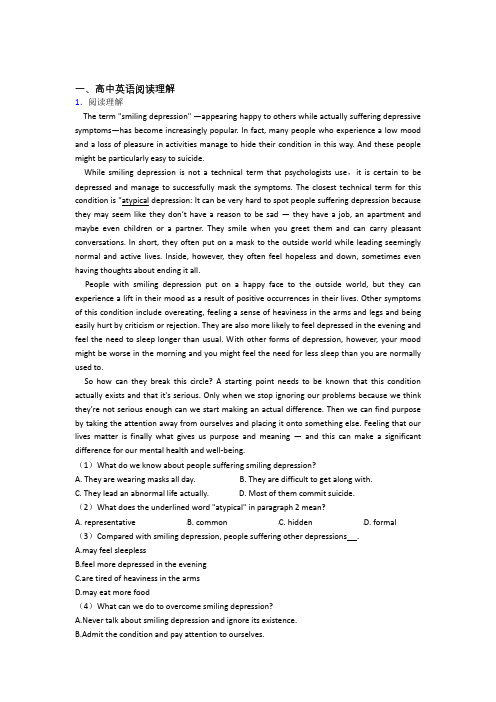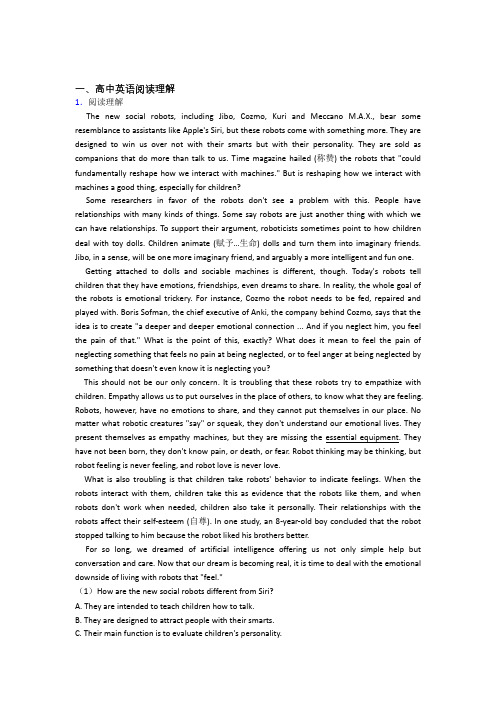2020-2021高考英语专题复习分类练习 阅读理解综合解答题及详细答案
2020-2021高考英语综合题专题复习【阅读理解】专题解析含答案

一、高中英语阅读理解1.阅读理解During this shopping season, salesmen will come up with different strategies to get your business. Many product companies use specific colors to cause positive emotions and compete for a sale. However, sight is not the only sensory (感官的) retail that companies use. Sounds and smells can also influence consumers' purchasing decisions.Nobel Prize-winning research shows that our sense of smell has great power to cause an emotional response. A study published earlier this year compared purchasing in a French flower shop when the smell of lavender (薰衣草) was given off and when it wasn't. It found that the smell increased the number of consumers' purchasing items and the amount of their purchases. An earlier study using Nike shoes found that consumers desired the shoes more, and were willing to pay more, when the room had a mixed smell of flowers. Realizing the subconscious impact of smell, many stores apply artificial scents (气味) through their heating and air-conditioning vents (通风口) or place scent machines above their doors. For instance, a coconut scent might make that bikini more appealing as you long for a vacation.Ever felt frenzied due to a store's fast-paced music? Or calmed by a piece of light music? A retailer's choice of music can have a big impact on consumers' moods. One study found that when subjected to loud music, consumers will spend less time in a store. But interestingly, the researchers did not find a difference in sales or customers' satisfaction. Another interesting finding from a recent study was that customers actually shop longer when exposed to unfamiliar music. Just as department stores use different scents in certain departments, many use different music in some areas to appeal to varying consumers.Well, you could always leave the store and take a break, but the food court probably isn't your best choices as brands like Cinnabon and Panera Bread also use scents as part of their customers' experience. Online retailers (零售商) use a variety of other strategies to get your business, but you can always neglect those and enjoy the familiar scents of home.(1)The passage is mainly about ________.A. consumers' favorite sounds and smells while shoppingB. shopping malls' strategies for satisfying consumersC. some special services from super shopping mallsD. two factors affecting consumers' shopping decisions(2)What can be inferred from Paragraph 2?A. Decorating stores with flowers becomes a fashion.B. Shops with special smells can attract more consumers.C. Smells can actually help businessmen gain more profits.D. The products with a kind of special smell are more popular.(3)How does music have an effect on consumers?A. It controls consumers' desire for shopping.B. It influences how long consumers stay in a shop.C. It gives consumers the satisfaction of enjoying shopping.D. Whether consumers are willing to buy things depends on it.(4)Which of the following can replace the underlined word “frenzied” in Paragraph 3?A. Satisfied.B. Depressed.C. Surprised.D. Excited.(5)What does the writer try to express in the last paragraph?A. Online shopping is becoming more and more popular nowadays.B. People should spend more time at home with family members.C. People can choose to get rid of salesmen's promotion strategies.D. Smells and sounds are important for consumers' shopping experience.【答案】(1)D(2)C(3)B(4)D(5)C【解析】【分析】本文为说明文。
2020-2021高考英语专题复习阅读理解的综合题含答案解析

一、高中英语阅读理解1.阅读理解Scientists at the University of Oxford have developed new artificial intelligence(AI) software to recognize and follow up the faces of chimpanzees(黑猩猩)in the wild. The new software will allow researchers and wildlife conservationists to significantly cut back on time spent analyzing videos, according to the new paper published in Science Advances.For species(物种)like chimpanzees which have complex social lives and live for many years, getting photos of their behavior taken from short-term field research can only tell us so much," says Dan Schofield, researcher and DPhil student at Oxford University's Private Models Lab, School of Anthropology. "By taking advantage of the power of machine learning to unlock large video files, it makes it possible to measure behavior over the long term."The computer model was trained using over 10 million images(影像):from Kyoto University s Primate Research Institute(PRI) video files of wild chimpanzees in Guinea, West Africa. The new software is the first to continuously track and recognize individual a wide range of poses, performing with high accuracy in difficult conditions such as low lighting and poor image quality. "Access to this large video file has allowed us to use deep neural networks to train models to a degree that was previously not possible," says Arsha Nagrad, co-auther of the study and DPhil student at the Department of Engineer Science, University of Oxford." Additionally, our new software differs from previous primate face recognition software in that it can be applied to videos with limited manual intervention(人工干预), saving hours of time."The technology can be potentially used to monitor species for conservation Although the present application focuses on chimpanzees, the AI software provided will be applied to other species, and help drive the adoption of AI systems to solve(解决)a range of problems in the wildlife sciences.(1)What is the purpose of developing the new soft?A.To save wildlife researchers' time spent in the labs.B.To keep track of wildlife conservationists' behaviors.C.To protect chimpanzees and help them to live longer.D.To recognize and track the faces of wild chimpanzees.(2)What does the underlined word "it" in paragraph 2 refer to?A.Getting photos.B.Analyzing videos.C.A powerful machineD.The new AI software.(3)What does paragraph 4 mainly talk about?A.The working principle of the new software.B.Some limitations of using the new software.C.The unique advantages of the new software.D.Controversial attitudes to the new software.(4)What can be known from the last paragraph?A.Technology advance is the final goal of scienceB.The new software won't just be applied to chimpanzees.C.AI systems are widely used in the wildlife sciences.D.The application of the new technology isn't easy.【答案】(1)D(2)D(3)C(4)B【解析】【分析】本文是一篇说明文,介绍了一种新的人工智能软件,这种软件可以识别和追踪黑猩猩的面孔,大大节省了研究者和野生动物保护者的时间,而且它还可以应用到其他的物种研究。
2020-2021全国各地高考英语分类:阅读理解综合题汇编附答案解析

一、高中英语阅读理解1.阅读理解A great number of species make their home in the vast waters of the Atlantic Ocean. Although the entire ocean makes up an ecosystem, many smaller habitats are found within, including an open-water habitat off the coast of the Northern Atlantic Ocean known as the Sargasso Sea. Sargassum is an alga(海藻) that floats in masses that can continue for miles. The waters of the Gulf Stream push the water in a northward move into this area. This constant move and varying temperature support the accumulation of the brown-colored seaweed.The Sargasso Sea is so enormous that one method of information collection has not been enough for scientists to obtain an accurate picture of what takes place within this ecosystem. Researchers have needed to employ several methods of sampling. Methods such as dragging nets over the surface of the water and videotaping beneath areas of sargassum have served scientists well. Information collected has shown that the Gulf Stream pushes brown algae from open water into the Sargasso Sea area, creating a diverse floating habitat in an area that would otherwise not support that wildlife.In the most recent study of the sargassum community off the shores of North Carolina, eighty-one fish species were documented as using the area as a microhabitat. This is an increase from previous studies. The types of fish found here are both commercially and environmentally important. The South Atlantic Fishery Management Council is working to regulate the harvesting of sargassum. The Council hopes to have the area classified as an Essential Fish Habitat. Which would afford it certain protections.Further research needs to be done before scientists understand how to best protect the Sargasso Sea as well as understand how it goes about supporting so many important types of wildlife.(1)The author uses "enormous" in paragraph 2 to stress that .A. the Atlantic Ocean is really amazing in terms of its size and areaB. what the researchers do is highly respected by scientific communityC. the research work is complex because a large area must be coveredD. a large amount of money for the Sargasso Sea research is needed(2)It can be inferred from the phrase "needed to be done" in paragraph 4 that the author thinks .A.the Sargasso ecosystem is worth our attention and needs more studyB.the scientific community has ignored this complex ecosystemC.the Sargasso Sea is becoming a problem and needs removingD.new methods for researching the ecosystem must be found instantly(3)The text is mainly about .A.diversity of wildlife in the Atlantic OceanB.different habitats of sea animalsC.methods of information collectionD.the Sargasso Sea as an entire ecosystem【答案】(1)C(2)A(3)D【解析】【分析】本文是一篇说明文,介绍了马尾藻海这个完整的生态系统,非常巨大以至于一种信息收集方法不足以让科学家准确了解这个生态系统中发生的情况,这里发现的鱼类种类在商业和环境上都很重要。
2020-2021全国高考英语阅读理解的综合高考模拟和真题分类汇总含详细答案

一、高中英语阅读理解1.阅读理解Plastic sludge(污泥)and garbage is a disaster for the world's oceans. A film crew traveled the globe to document the rubbish. And Julie Andersen of the Plastic Oceans Foundation says what we see is just the tip of the problem. “Half o f the waste actually sinks to the bottom, and that remains on the surface actually breaks down. ”The filmmakers found rubbish in ocean gyres, the circulating currents that trap large concentrations of pollution in the Atlantic, Indian, and Pacifc Oceans, home of what some have plastic. What we found was a plastic smog that spread throughout all the water. And in some parts of the oceans, scientists have found more plastic than plant. ”The pieces of the plastic garbage infect the food chain, sometimes visibly, and more so at the microscopic level, where the plastic particles interact with other pollutants. “There are heavy metals, medicines, industrial waste in the sea, while it acts like magnets(磁铁). These poisonous substances absorb on the plastic, and then when seafood absorbs the plastics, those poisonous substances enter the fatty tissues. ”To be consumed by other sea life and by people at last. China, Indonesia, the Philippines, Thailand and Vietnam are the worst plastic polluters. The United States, although a leader in recycling, is one of the world's 20 since it produces and consumes so much plastic. There are efforts around the world to address the problem, including at this newly opened recycling center in Lebanon(黎巴嫩). But Andersen says there is more that people can do. “Cut back on single-use plastics, straws, plastic cups, plastic water bottles, plastic bags and find alternatives like reusable materials.” She says healthy oceans are essential to our survival.(1)What can we learn from the passage?A. There's all island full of plastic rubbish in the Pacific.B. The bad effect of plastic pollution can't be seen by eyes.C. The United States is the least plastic polluters.D. The plastic pollution to oceans is more serious than what we can see.(2)What does the underlined word “it” refer to in paragraph 3?A. Pollutants like heavy metals and medicines.B. The plastic particles.C. Seafood.D. Fatty tissues.(3)What can be inferred from the last paragraph?A. All Asian countries have the most serious problem of plastic pollution.B. The plastic problem hasn't attracted the world's attention.C. Andersen is not satisfied with what has been done to solve the plastic problem,D. People should stop using plastic products immediately.(4)Which may be the title of the passage?A. Plastic pollution in the World.B. Plastic pollution—Oceans'Disaster.C. Ways to solve the problem of plastic pollution to oceans.D. Plastic pollution and our health.【答案】(1)D(2)B(3)C(4)B【解析】【分析】这是一篇说明文。
2020-2021高考英语综合题专题复习【阅读理解】专题解析附详细答案

一、高中英语阅读理解1.阅读理解The term "smiling depression" —appearing happy to others while actually suffering depressive symptoms—has become increasingly popular. In fact, many people who experience a low mood and a loss of pleasure in activities manage to hide their condition in this way. And these people might be particularly easy to suicide.While smiling depression is not a technical term that psychologists use,it is certain to be depressed and manage to successfully mask the symptoms. The closest technical term for this condition is "atypical depression: It can be very hard to spot people suffering depression because they may seem like they don't have a reason to be sad —they have a job, an apartment and maybe even children or a partner. They smile when you greet them and can carry pleasant conversations. In short, they often put on a mask to the outside world while leading seemingly normal and active lives. Inside, however, they often feel hopeless and down, sometimes even having thoughts about ending it all.People with smiling depression put on a happy face to the outside world, but they can experience a lift in their mood as a result of positive occurrences in their lives. Other symptoms of this condition include overeating, feeling a sense of heaviness in the arms and legs and being easily hurt by criticism or rejection. They are also more likely to feel depressed in the evening and feel the need to sleep longer than usual. With other forms of depression, however, your mood might be worse in the morning and you might feel the need for less sleep than you are normally used to.So how can they break this circle? A starting point needs to be known that this condition actually exists and that it's serious. Only when we stop ignoring our problems because we think they're not serious enough can we start making an actual difference. Then we can find purpose by taking the attention away from ourselves and placing it onto something else. Feeling that our lives matter is finally what gives us purpose and meaning —and this can make a significant difference for our mental health and well-being.(1)What do we know about people suffering smiling depression?A. They are wearing masks all day.B. They are difficult to get along with.C. They lead an abnormal life actually.D. Most of them commit suicide.(2)What does the underlined word "atypical" in paragraph 2 mean?A. representativeB. commonC. hiddenD. formal(3)Compared with smiling depression, people suffering other depressions .A.may feel sleeplessB.feel more depressed in the eveningC.are tired of heaviness in the armsD.may eat more food(4)What can we do to overcome smiling depression?A.Never talk about smiling depression and ignore its existence.B.Admit the condition and pay attention to ourselves.C.Value the importance of our life and enjoy it.D.Find out the problem and place it onto somebody else.【答案】(1)C(2)C(3)A(4)C【解析】【分析】本文是一篇说明文,介绍了“微笑抑郁”这个名字的来历,相关的症状,以及克服这种抑郁症的方法。
2020-2021高考英语专题复习分类练习 阅读理解综合解答题含答案解析

一、高中英语阅读理解1.阅读理解On average, Americans spend about 10 hours a day in front of a computer or other electronic devices and less than 30 minutes a day outdoors. That is a claim made by David Strayer, a professor of psychology at the University of Utah. In his 2017 TED Talk, Strayer explained that all this time spent with technology is making our brains tired.Using an electronic device to answer emails, listen to the news and look at Facebook puts a lot of pressure on the front of the brain, which, Strayer explains , is important for critical (有判断力的)thinking , problem-solving and decision-making.So, it is important to give the brain a rest. And being in naure, Strayer claims, helps get a tired brain away from too much technology. More than 15,000 campers from around the world attended an international camping festival in September. That is when friends and family take time off and escape to nature for several days. They take walks, climb, explore, swim, sleep, eat and play. Camping may be just what a tired brain needs.Take Carl for example .He lives in West Virginia and enjoys camping. He says that staying outdoors makes him feel at ease. It also prepares him for the work he must do. Kate Somers is another example who also lives in West Virginia. She says she enjoys camping with her husband and two children. She calls it a “regenerative” experience.At the University of Utah, David Strayer has studied both short-term and long-term exposure to nature. He found that spending short amounts of time in nature without technology does calm the brain and helps it to remember better. However, he found, it is the long-term contact with nature that does the most good. He and his research team found that spending three days in nature without any technology is enough time for the brain to fully relax and reset itself.(1)What is David Strayer's opinion?A. Americans dislike outdoor activities.B. Electronic equipment should be quitted.C. New technologies are a double-edged sword.D. Electronic equipment brings great convenience.(2)Why does Strayer insist we go outdoors?A. To try another lifestyle.B. To refresh our brain.C. To make better decisions.D. To play with our family and friends.(3)What does the underlined word “regenerative” mean?A. RebornB. MemorableC. RemarkableD. Tiring(4)Which is the proper title for the passage?A. Electronic Equipment Harms the Brain.B. Good Rest Develops Good Memory.C. Tips on Using New Technologies.D. Being in Nature Is Good for the Brain.【答案】(1)C(2)B(3)A(4)D【解析】【分析】本文属于科普文,主要阐述电子产品的过多使用让大脑得不到休息,因而鼓励人们多进行户外活动,让大脑休息。
2020-2021全国高考英语阅读理解的综合高考模拟和真题分类汇总含答案解析

一、高中英语阅读理解1.阅读理解A dog spent the last four years of his life waiting a crossroad in the Thai city of Khon Kaen as if waiting for someone. People originally thought the dog had been abandoned, but then realized that he looked healthy, so people asked around about him. It turned out that the dog had indeed been spending most of his time around that crossroad, but a woman had been coming -.round regularly to bring him food and water.One day, while photographing the dog everyone called Leo, a reporter met the woman who had been taking care of him. She had come to drop off some food. After learning the story about the dog and the woman, the reporter decided to share the story on social media. The post soon went viral and the photos of Leo got shared hundreds of times. And the photos reached the eyes of Leo^ former old owner.Nang Noi Sittisarn, a 64-year-old woman from Thailand's Roi Et Province, almost had a heart attack when her daughter showed her a photo of the beloved dog named BonBon she had lost during a car trip. When she learned that he had been waiting for her in the same spot for the last four years,her heart melted(融化).Auntie Noi told her daughter to drive her to where the dog was waiting. When she got there and called his name. BonBon, the poor dog started wiggling(扭动)his tail and came to her,but when she tried to take him home with her, he was unwilling to follow. She didn't want to force the dog to come with her so she agreed to leave him with his new master. However, she and her daughter will come to visit him regularly.(1)Why did the dog look healthy after separation from his former owner?A.He walked around the crossroad constantly.B.He was kept at a woman's home all the time.C.A local reporter brought him food and water.D.A woman looked after him on a regular basis.(2)What does the underlined phrase "went viral" in paragraph 2 probably mean?A.Changed surprisingly.B.Spread quickly.C.Appeared gradually.D.Fell directly.(3)How did Nang Noi Sittisam feel about the dog's waiting for her?A.Shocked.B.Regretful.C.Touched.D.Proud(4)What can we mainly learn from the story about the dog?A.Unbelievable success is worth waiting for.B.We should adjust ourselves to environments.C.We need to learn to be faithful and thankful.D.No one knows the result until the last minute.【答案】(1)D(2)A(3)C(4)C【解析】【分析】本文是一篇记叙文。
2020-2021高考英语综合题专题复习【阅读理解】专题解析附答案

一、高中英语阅读理解1.阅读理解The new social robots, including Jibo, Cozmo, Kuri and Meccano M.A.X., bear some resemblance to assistants like Apple's Siri, but these robots come with something more. They are designed to win us over not with their smarts but with their personality. They are sold as companions that do more than talk to us. Time magazine hailed (称赞) the robots that "could fundamentally reshape how we interact with machines." But is reshaping how we interact with machines a good thing, especially for children?Some researchers in favor of the robots don't see a problem with this. People have relationships with many kinds of things. Some say robots are just another thing with which we can have relationships. To support their argument, roboticists sometimes point to how children deal with toy dolls. Children animate (赋予…生命) dolls and turn them into imaginary friends. Jibo, in a sense, will be one more imaginary friend, and arguably a more intelligent and fun one.Getting attached to dolls and sociable machines is different, though. Today's robots tell children that they have emotions, friendships, even dreams to share. In reality, the whole goal of the robots is emotional trickery. For instance, Cozmo the robot needs to be fed, repaired and played with. Boris Sofman, the chief executive of Anki, the company behind Cozmo, says that the idea is to create "a deeper and deeper emotional connection ... And if you neglect him, you feel the pain of that." What is the point of this, exactly? What does it mean to feel the pain of neglecting something that feels no pain at being neglected, or to feel anger at being neglected by something that doesn't even know it is neglecting you?This should not be our only concern. It is troubling that these robots try to empathize with children. Empathy allows us to put ourselves in the place of others, to know what they are feeling. Robots, however, have no emotions to share, and they cannot put themselves in our place. No matter what robotic creatures "say" or squeak, they don't understand our emotional lives. They present themselves as empathy machines, but they are missing the essential equipment. They have not been born, they don't know pain, or death, or fear. Robot thinking may be thinking, but robot feeling is never feeling, and robot love is never love.What is also troubling is that children take robots' behavior to indicate feelings. When the robots interact with them, children take this as evidence that the robots like them, and when robots don't work when needed, children also take it personally. Their relationships with the robots affect their self-esteem (自尊). In one study, an 8-year-old boy concluded that the robot stopped talking to him because the robot liked his brothers better.For so long, we dreamed of artificial intelligence offering us not only simple help but conversation and care. Now that our dream is becoming real, it is time to deal with the emotional downside of living with robots that "feel."(1)How are the new social robots different from Siri?A. They are intended to teach children how to talk.B. They are designed to attract people with their smarts.C. Their main function is to evaluate children's personality.D. They have a new way to communicate with human beings.(2)In Paragraph 3 Cozmo is used as an example to show that the social robots ______.A. are deeply connected with human beingsB. are unable to build a real relationship with childrenC. are so advanced that they can feel the pain of human beingsD. are not good enough to carry out the instructions of children(3)The underlined phrase "essential equipment" in Paragraph 4 refers to ______.A. emotionB. painC. fearD. thinking(4)Which of the following shows the development of ideas in the passage?I: Introduction P: Point Sp: Sub-point (次要点) C: ConclusionA. B.C. D.【答案】(1)D(2)B(3)A(4)B【解析】【分析】本文是一篇议论文,新的社交机器人与以往机器人不同,他们不仅比我们聪明还有他们的个性。
2020-2021高考英语复习阅读理解专项综合练附详细答案

一、高中英语阅读理解1.阅读理解Jane Austen is loved mainly as a charming guide to fashionable life in the Regency period (英国摄政时期). She is admired for describing a world of elegant houses, dances, servants and fashionable young men driving barouches (四轮四座大马车). But her own vision of her task was completely different. She was an ambitious and strict moralist. She was highly conscious of human failings and she had a deep desire to make people nicer: less selfish, more reasonable and more sensitive to the needs of others.In Pride and Prejudice, Mr. Darcy and Elizabeth Bonnet start off heartily disliking each other and then, gradually realize they are in love. They make one of the great romantic couples. He is handsome, rich and well connected; she is pretty, smart and lively. But why actually are they right for one another?Jane Austen is very clear. It's for a reason we tend not to think of very much today: It is because each can educate and improve the other. When Mr. Darcy arrives in the neighborhood, he feels "superior" to everyone else, because he has more money and higher status. At a key moment, Elizabeth condemns his arrogance (自大) and pride to his face. It sounds offensive in the extreme, but later he admits that this was just what he needed.Mostly, we tend to think of love as liking someone for who they already are, and of total acceptance. But the person who is right for us, Austen is saying, is not simply someone who makes us feel relaxed or comfortable; they got to be able to help us overcome our failings and become more mature, more honest and kinder—and we need to do something similar for them.(1)What do we know about Jane Austen from paragraph 1?A. She lived a fashionable life.B. She wrote about the life of the rich.C. She knew exactly human virtues.D. She was nicer to less selfish people.(2)What can we learn about Mr. Darcy from the text?A. He dislikes Elizabeth from the beginning to the end.B. He is handsome, rich and rather modest.C. He is kind to everyone in the neighborhood.D. He needs Elizabeth to point out his shortcomings.(3)Which person is right for you according to Jane Austen?A. A person that you like for who he or she is.B. A person with whom you feel really relaxed.C. A person making you become a better man or woman.D. A person who does something similar to you.(4)What message does the book Pride and Prejudice convey?A. Improve yourself with your lover's help.B. Accept the people you love totally.C. Earn much money to make people love you.D. Find your true love with pride and prejudice.【答案】(1)B(2)D(3)C(4)A【解析】【分析】本文是一篇应用文,介绍了简·奥斯丁的著作《傲慢与偏见》中传达了在爱人的帮助下提高自己的思想。
2020-2021高考英语复习阅读理解专项综合练含详细答案

一、高中英语阅读理解1.阅读理解Your teenage best friend could be good for your long-term mental health, according to a new study published in the journal Child Development According to the findings, teenagers aged 15 to 16 who had a close friendship rather than a larger group of friends they were less close to had a greater sense of self-worth by the time they were 25 years old. Those people with a very close best friend were also less likely to experience depression and social anxiety, the study found. "Close friendship strength in mid-adolescence predicted relative increases in self-worth and decreases in anxiety and depressive symptoms by early adulthood, "the authors, led by Rachel K, Narr, a postdoctoral student focused on clinical psychology at the University of Virginia, wrote.A past research has suggested that adolescent friendships are important. Friendships during the teenage years predict academic success and improved mental health. But the new research further explores the type of friendships teenagers have. "My hunch(预感)was that close friendships compared to broader friendship groups and popularity may not function the same way," Narr told Quartz. "Being successful in one is not the same as being successful in the other." Many study participants did not continue to have a close relationship with their high-school best friend, leading the researchers to wonder what exactly was responsible for the mental health benefits. They suspected that the skills and ability to build such a friendship may be more important than the friendship itself.And as the researchers point out, those skills are not necessarily brought to bear in the world of social media. "As technology makes it increasingly easy to build a social network of shallow friends, focusing time and attention on developing close connections with a few individuals should be a priority," study co-author Joseph Allen said in a statement.(1)What is the benefit of having a close teenage friendship?A. Excellent performance in high school.B. A larger group of friends.C. Mental health by early adulthood.D. A large social network in the future.(2)What can we learn about the past research?A. It attached great significance to adolescent friendships.B. It was totally different from the new research.C. It helped improve teenagers' mental health.D. It compared broader friendship groups with popularity.(3)What did the researchers think might lead to the mental health benefits?A. Not continuing to have a close relationship.B. Having a best friend in high school.C. Understanding the world of social media.D. Knowing how to build a close friendship (4)What did the researcher Joseph suggest?A. Learning to use social media.B. Broadening your social circle.C. Improving the skills of making friends.D. Concentrating on high-quality relationship.【答案】(1)C(2)A(3)D(4)D【解析】【分析】本文是一篇说明文,研究发现,那些有非常亲密的好朋友的人也不太可能经历抑郁和社交焦虑。
2020-2021高考英语专题训练---阅读理解的综合题分类附答案

一、高中英语阅读理解1.阅读理解Since we've headed into the snowy part of the year, it seems like a good time to solve a language puzzle that Eskimos have a huge number of words for snow. The idea was popularized by the now well-known expert Benjamin Lee Whorf in the 1940s. His number was approximately five Eskimo words for snow, but somehow the story was so wide spread and romantic that it got out of control and grew bigger and bigger.There are two problems with the concept of Eskimos having tons of words for snow.First, Eskimos speak at least two different languages—Inuit and Yupik. Just as we have talked about how English and many other languages developed from a common language called Proto-Indo-European, Inuit and Yupik come from a different common language called Eskimo-Aleut. So saying Eskimos have 100 words for snow is like saying Europeans have 100 words for kings or queens. It might be telling you something broad about culture, but it isn't really telling you much about language.The second problem is "What is a word?” The Inuit and Yupik languages make words in different ways from how we make words in English. For example, the West Greenlandic word 'siku,' (sea ice), is used as the root for 'sikursuit (pack ice), 'Sikuliaq (new ice), and 'sikurluk (melting ice). But it's not that West Greenlandic has so many more words for describing snow than English, it's just that West Greenlandic expresses ideas by combining meaningful units of language together into one word while English uses more phrases and compounds. We express all the same ideas; we just do it a little differently because of the way our language is built.So you're probably still wondering, "If it's not 50 or 100 or 400 words, how many is it?" Well, Woodbury lists 15 that are present in a Yupik dictionary published in 1984, but he says that depending on how you look at it this is not an exact number. It could be 12; it could be 24. But it's certainly not 100.Sometimes, the "hundred words for snow" puzzle is used to argue that because Eskimos have so many words for snow, they think about snow in ways that we can't even begin to imagine—that your language decides or limits your thoughts. Languages are just different. They don't decide what we are able to think about or are not able to think about. I can think about snow floating on water even if we don't have a word for that in English.So when you're out skiing or snowboarding or just shoveling your driveway this winter, don't believe the people who try to tell you that Eskimos have 100 words for snow.(1)Why are Eskimos thought to have so many words for snow?A. Because snow is everywhere where Eskimos live.B. Because the story about it got enriched and believed.C. Because snow is of great importance to Eskimos.D. Because Eskimos have great affection for snow.(2)How does the writer explain the first problem?A. By presenting figures.B. By making comparisons.C. By quoting sayings.D. By adopting idioms.(3)The example of the west Greenlandic word 'siku' shows that .A. the making of words varies from language to languageB. the Inuit and Yupik languages have more words for snowC. the richness of words and phrases leads to different ideasD. more phrases about snow are found in the English language(4)What conclusion can we safely draw from the last two paragraphs?A. Eskimos better understand snow than other people.B. Languages deeply influence people's ability to think.C. There is no point counting Eskimo's expressions for snow.D. What comes into our mind is limited by our language.【答案】(1)B(2)B(3)A(4)C【解析】【分析】本文是一篇说明文,介绍了爱斯基摩人描述雪的词语虽然多但并非传言中的100多个。
2020-2021全国各地高考英语分类:阅读理解综合题汇编含答案解析

一、高中英语阅读理解1.阅读理解Artificial intelligence can predict when patients with a heart disorder will die, according to scientists.The software learned to analyze blood tests and scans of beating hearts to spot signs that the organ was about to fail. The team, from the UK's Medical Research Council, said the technology could save lives by finding patients that need more aggressive treatment. The results were published in the Journal of Radiology.According to the researchers, high blood pressure in the lungs damages part of the heart, and about a third of patients die within five years after being diagnosed. There are treatments: drugs, injections straight into the blood vessels, a lung transplant. But doctors need to have an idea of how long patients might have left, in order to pick the right treatment.The software was given scans of 256 patients' hearts, and blood test results. When this data was combined with eight years of patient health records, the artificial intelligence predicted when patients would die.The software could look about five years into the future. It correctly predicted those who would still be alive after one year about 80% of the time. The figure for doctors is 60%.The team now want to test the software works in other patients in different hospitals before assessing whether it should be made widely available to doctors. The researchers also want to use the technology in other forms of heart failure, such as cardiomyopathy, to see who might need a pacemaker or other forms of treatment.Dr Mike Knapton, from the British Heart Foundation, said, "This exciting use of computer software in medical practice will help doctors in the future to make sure that patients are receiving the correct treatment before the condition deteriorates and leaves them needing a lung transplant. The next step is to test this technology in more hospitals with heart disease."(1)What can artificial intelligence do according to the passage?A. Predicting how long a person with heart disease can survive.B. Helping doctors diagnose people with heart disease.C. Obeying orders and reminding heart disease patients to take pills.D. Producing medicine without side effects for heart disease patients.(2)What can we know about the software from the passage?A. It can make accurate long-term predictions.B. It has not yet been widely put into use.C. It can prevent high blood pressure in the lungs damaging part of the heart.D. It can help doctors make sure that patients are receiving the correct treatment.(3)The underlined word "deteriorates" in the last paragraph probably means "________."A. continuesB. worsensC. existsD. improves(4)The author's purpose of writing the text is most likely to _________.A. advertiseB. persuadeC. informD. entertain【答案】(1)A(2)B(3)B(4)C【解析】【分析】本文是一篇说明文,科学家称,人工智能可以预测心脏病患者何时死亡,这项技术可以通过找到需要更积极治疗的病人来挽救生命。
2020-2021高考英语专题复习分类练习 阅读理解综合解答题附答案

一、高中英语阅读理解1.阅读理解It started during a yoga class. She felt a strange pull on her neck, a feeling completely foreign to her. Her friend suggested she rush to the emergency room. It turned out that she was having a heart attack.She didn't share similar symptoms with someone who was likely to have a heart attack. She exercised, watched her plate and did not smoke. But on reviewing her medical history, I found that her cholesterol (胆固醇) level was sky-high. She had been prescribed a cholesterol-lowering statin (他汀) medication, but she never picked up the prescription because of the scary things she had read about statins on the Internet. She was the victim of fake medical news.While misinformation has been the object of great attention in politics, medical misinformation might lead to an increase in deaths. As is true with fake news in general, medical lies tend to spread further than truths on the Internet—and they have very real bad consequences.False medical information can also lead to patients experiencing greater side effects through the "nocebo effect (反安慰剂效应) ". Sometimes patients benefit from an intervention (干预) simply because they believe they will—that's the placebo effect (安慰剂效应). The nocebo effect is the opposite. Patients can experience harmful effects because they anticipate them. This is very true of statins. In blinded trials, patients who get statins are no more likely to report feeling muscle aches than patients who get a placebo. Yet, in clinical practice, according to one study, almost a fifth of patients taking statins report side effects, leading many to discontinue the drugs. What else is on the fake news hit list? As always, vaccines (疫苗) . False concerns that the vaccine may cause side effects have greatly reduced coverage rates.Cancer is another big target for pushers of medical misinformation—many of whom refuse alternative therapies. "Though most people think cancer tumors are bad, they're actually the way your body attempts to contain the harmful cells," one fake news story reads. It warns that prescription medications lead to the uncontrolled cell mutations (变异) .Silicon Valley needs to face this problem. I am not a free-speech lawyer, but when human health is at risk, perhaps search engines, social media platforms and websites should be held responsible for promoting or hosting fake information. Meanwhile, journalists should do a better job of spreading accurate information.(1)We can learn from Paragraph 2 that ________.A. the woman paid little attention to her daily dietsB. the unhealthy lifestyle might lead to the woman's heart attackC. the symptom of the heart attack was familiar to the womanD. the woman didn't take the prescription due to fake medical news(2)According to the passage, the placebo effect functions because patients ________. A. neglect necessary treatment B. discontinue the harmful drugsC. believe the benefits of an interventionD. suffer more side effects(3)What does the author mean by claiming that "he is not a free-speech lawyer" in the lastparagraph?A. He is a lawyer very easy to speak to.B. He is good at speaking because of his job.C. He is available to give a speech on the law.D. He is very cautious when speaking something(4)The main purpose of the passage is to ________.A. remind us to take medication as prescribedB. warn us against fake medical news on the InternetC. encourage journalists to report more positive news eventsD. teach us how to distinguish fake medical news on the Internet【答案】(1)D(2)C(3)D(4)B【解析】【分析】本文是一篇议论文,通过举例来论证了网络谣言,尤其是关于药物的网络谣言有巨大的杀伤力。
2020-2021高考英语复习阅读理解专项综合练及答案解析

一、高中英语阅读理解1.阅读理解When John was growing up, other kids felt sorry for him. His parents always had him weeding the garden, carrying out the garbage and delivering newspapers. But when John reached adulthood, he was better off than his childhood playmates. He had more job satisfaction, a better marriage and was healthier. Most of all, he was happier. Far happier.These are the findings of a 40-year study that followed the lives of 456 teenage boys from Boston. The study showed that those who had worked as boys enjoyed happier and more productive lives than those who had not. "Boys who worked in the home or community gained competence (能力) and came to feel they were worthwhile members of society, "said George Vaillant, the psychologist (心理学家) who made the discovery. "And because they felt good about themselves, others felt good about them."Vaillant's study followed these males in great detail. Interviews were repeated at ages 25, 31 and 47. Under Vaillant, the researchers compared the men's mental-health scores with their boyhood -activity scores. Points were awarded for part-time jobs, housework, effort in school, and ability to deal with problems.The link between what the men had done as boys and how they turned out as adults was surprisingly sharp. Those who had done the most boyhood activities were twice as likely to have warm relations with a wide variety of people, five times as likely to be well paid and 16 times less likely to have been unemployed. The researchers also found that IQ and family social and economic class made no real difference in how the boys turned out.Working—at any age—is important. Childhood activities help a child develop responsibility, independence, confidence and competence—the underpinnings (基础) of emotional health. They also help him understand that people must cooperate and work toward common goals. The most competent adults are those who know how to do this. Yet work isn't everything. As Tolstoy once said, "One can live magnificently in this world if one knows how to work and how to love, to work for the person one loves and to love one's work."(1)What do we know about John?A. He enjoyed his career and marriage.B. He had few childhood playmates.C. He received little love from his family.D. He was envied by others in his childhood.(2)Vaillant's words in Paragraph 2 serve as ________.A. a description of personal values and social valuesB. an analysis of how work was related to competenceC. an example for parents' expectations of their childrenD. an explanation why some boys grew into happy men(3)Vaillant's team obtained their findings by ________.A. recording the boys' effort in schoolB. evaluating the men's mental healthC. comparing different sets of scoresD. measuring the men's problem solving ability (4)What does the underlined word "sharp" probably mean in Paragraph 4?A. Quick to react.B. Having a thin edge.C. Clear and definite.D. Sudden and rapid.【答案】(1)A(2)D(3)C(4)C【解析】【分析】本文是一篇说明文,研究表明,那些小时候工作过的人比那些没有工作过的人生活得更快乐、更有成效。
2020-2021高考英语专题复习分类练习 阅读理解综合解答题及答案

一、高中英语阅读理解1.阅读短文,从每题所给的A、B、C和D四个选项中,选出最佳选项。
Many people have long dreamed of being able to fly around as simply as riding a bicycle. Yet the safety and strength of a flying bike was always a big problem. Over the past 10 years, developments in technology have moved the dream of personal flying vehicles closer to reality. Now, two groups of inventors say such vehicles may be available soon.The British company Malloy Aeronautics has developed a prototype (原型) of its flying bicycle. Grant Stapleton, marketing sales director of Malloy Aeronautics, says the Hoverbike is able to get in and out of small spaces very quickly." It can be moved across continents very quickly because it can be folded and packed," he adds.Mr. Stapleton says safety was the company's main concern. He says the designers solved the safety issue by using overlapping rotors to power the vehicle.The company is testing a full-size prototype of the Hoverbike, which will most likely be used first by the police and emergency rescue teams.In New Zealand, Martin Aircraft Company is also testing a full-size prototype of its personal flying device, called the Jetpack. It can fly for more than 30 minutes, up to 1, 000 meters high and reach a speed of 74 kilometers per hour.Peter Coker is the CEO of Martin Aircraft Company. He said the Jetpack "is built around safety from the start". In his words, "Reliability is the most important element of it. We have safety built into the actual structure itself, very similar to a Formula One racing car.The Jetpack uses a gasoline-powered engine that produces two powerful jet streams. Mr. Coker says it also has a parachute that would be used, if there should be an emergency. "It starts to work at very low altitude and actually saves both the aircraft and the pilot," he adds. Mr. Coker says the Jetpack will be ready for sale soon.(1)We can learn from the passage that the Hoverbike ________.A. can hardly get in and out of small spaces quicklyB. can fly for over 30 minutes, up to 1, 000 meters highC. has been used by the police and emergency rescue teamsD. can be transported quickly after being folded and packed(2)Peter Coker uses the example of Formula One racing car to show that ________.A. the Jetpack is very safe and reliableB. the engine of the Jetpack is powerfulC. the actual structure of the Jetpack is uniqueD. the Jetpack can reach a great speed and height(3)The underlined word "It" in the last paragraph refers to ________.A. the jet streamB. the engineC. the JetpackD. the parachute (4)What is the author's main purpose of writing the passage?A. To describe the problems of inventing flying vehicles.B. To introduce the latest development of flying vehicles.C. To show the differences between two flying vehicles.D. To advertise the two personal flying vehicles.【答案】(1)D(2)A(3)D(4)B【解析】【分析】本文是一篇说明文,讲述一种个人飞行工具很快就会应用于现实,然而安全性和强度一直是个大问题,文中介绍了两家研发飞行器的公司的最新的产品,新产品把安全放在首位,并对产品进行了改进。
2020-2021高考英语专题复习阅读理解的综合题及答案解析

一、高中英语阅读理解1.阅读理解The mayor of Flint offered Miss Michigan Emily Sioma high praise on Tuesday for speaking out at this weekend's Miss America conference about the city's water crisis."I was really excited for her to do that," Mayor Karen Weaver told TMZ. "I think she was very brave because so many times you say who you are and where you're from and just general information. For her to take that opportunity and use her platform and use her voice to speak up about what's going on in Michigan and in Flint, in particular, was just amazing."Emily Sioma, 24, introduced herself on stage on Sunday by saying, "From the state with 84 percent of the U. S. fresh water but none for its residents to drink. I am Miss Michigan Emily Sioma." The brief 'speech was a reference to Flint, a town with lead-filled drinking water.Weaver said Sioma's decision to speak about the Flint water crisis demonstrated her impressive character. "I applaud her for being a brave young woman. And it also shows you that she's not a selfish person," Weaver said. "She could have talked only about herself, but she chose to use this opportunity to bring attention to, and keep attention on, what's going on in Flint, what's going on with water quality standards what's going on with this broken infrastructure(基础设施) that we have across the country. "Ratings showed that 4. 3 million viewers watched the ABC program. Although Miss New York Nia Imani Franklin ultimately won the competition, many Twitter users quickly got behind Sioma, who did not make the final 15, after her introduction."Emily Sioma wanted to make an impact," one Twitter user wrote on Sunday. Regardless of whether you agree with what she said or not- she is shining light on a pressing issue that we have in our state and that is still not solved. That is a Miss America."(1)What does the underlined word "water crisis" refer to in Paragraph 1?A.Water transportation.B.Water shortage.C.Water reservation.D.Water quality.(2)How does the mayor find Emily Sioma?A.Curious and cautious.B.Brave and unselfish.C.Proud and admirable.D.Talkative and outgoing.(3)What does the author intend to do in Paragraph 5?A.Summarize the previous paragraphs.B.Introduce the ABC program.C.Emphasize Sioma's influence.D.Add some background information.(4)Which of the following is the best title for the passage?A.The Mayor of FlintB.A Twitter VoiceC.The ABC CompetitionD.A Miss America【答案】(1)D(2)B(3)C(4)D【解析】【分析】本文是一篇记叙文,Sioma在一次会议中大胆地提出了美国大城市用水质量存在的问题,Flint市的市长高度赞扬了她并认为她是一个勇敢且大公无私的人,网上的人们也表达了对此事的看法。
2020-2021高考英语综合题专题复习【阅读理解】专题解析及答案

一、高中英语阅读理解1.阅读理解A home science experiment recently took the world by storm. Two teens from Toronto, in Canada, sent a Lego man rising above the Earth and captured their tiny astronaut's trip on film.Mathew Ho and Asad Muhammad, both 17, used a weather balloon to launch their plastic lego model 16 miles above the Earth. This is inside a part of Earth's atmosphere.The two teens were inspired by a similar project performed by students at the Massachusetts Institute of Technology(MIT). The MIT students had launched a weather balloon with a camera into near space and taken many unusual images of the Earth. Mathew and Asad then spend four months figuring out how to launch their own spacecraft into the space.Travelling to space is expensive for NASA, but Mathew and Asad worked hard to keep their costs down. They bought much of their equipment used and even sewed the Lego man's parachute by hand. In total, the project cost only$400."We had a lot of anxiety on launch day because there were high winds when we were going up," Mathew told reporters. They had to pump extra helium(氦)into the balloon so that it would rise quickly and avoid being blown too far off course by the strong winds.The toy astronaut's journey lasted 97 minutes before the balloon broke and he fell back to Earth. Mathew and Asad then spent two weekends looking for their spacecraft. It had landed 76miles away from the launch site.The student scientists are currently finishing up their final year of high school and applying for colleges. They are also looking into more do-it-yourself space projects."I guess the sky is not really the limit anymore," Mathew told reporters. "We never knew we'd get this far. It's been a lesson for us that hard work pays off."(1)By saying "took the world by storm" in the first paragraph, the writer meant the experiment______________.A. destroyed the worldB. flooded the worldC. fascinated the worldD. managed the world(2)Which of the following about the students at the Massachusetts Institute of Technology is right?A.They were examples for Mathew Ho and Asad Muhammad.B.They helped Mathew Ho and Asad Muhammad to achieve dream.C.They launched weather balloon together with Mathew Ho and Asad Muhammad.D.They studied with Mathew Ho and Asad Muhammad in the same school.(3)How did Mathew Ho and Asad Muhammad keep their costs down?A.By sewing the weather balloon themselves.B.By borrowing spacecraft from the MIT students.C.By making their spacecraft by hand.D.By using second-hand equipment.(4)What problems did Mathew Ho and Asad Muhammad have on launch day?A.They ran out of helium.B.The wind was too strong.C.The balloon suddenly broke.D.Their spacecraft was blown away.【答案】(1)C(2)A(3)D(4)B【解析】【分析】这是一篇记叙文。
2020-2021高考英语专题训练---阅读理解的综合题分类含答案

一、高中英语阅读理解1.阅读理解Since we've headed into the snowy part of the year, it seems like a good time to solve a language puzzle that Eskimos have a huge number of words for snow. The idea was popularized by the now well-known expert Benjamin Lee Whorf in the 1940s. His number was approximately five Eskimo words for snow, but somehow the story was so wide spread and romantic that it got out of control and grew bigger and bigger.There are two problems with the concept of Eskimos having tons of words for snow.First, Eskimos speak at least two different languages—Inuit and Yupik. Just as we have talked about how English and many other languages developed from a common language called Proto-Indo-European, Inuit and Yupik come from a different common language called Eskimo-Aleut. So saying Eskimos have 100 words for snow is like saying Europeans have 100 words for kings or queens. It might be telling you something broad about culture, but it isn't really telling you much about language.The second problem is "What is a word?” The Inuit and Yupik languages make words in different ways from how we make words in English. For example, the West Greenlandic word 'siku,' (sea ice), is used as the root for 'sikursuit (pack ice), 'Sikuliaq (new ice), and 'sikurluk (melting ice). But it's not that West Greenlandic has so many more words for describing snow than English, it's just that West Greenlandic expresses ideas by combining meaningful units of language together into one word while English uses more phrases and compounds. We express all the same ideas; we just do it a little differently because of the way our language is built.So you're probably still wondering, "If it's not 50 or 100 or 400 words, how many is it?" Well, Woodbury lists 15 that are present in a Yupik dictionary published in 1984, but he says that depending on how you look at it this is not an exact number. It could be 12; it could be 24. But it's certainly not 100.Sometimes, the "hundred words for snow" puzzle is used to argue that because Eskimos have so many words for snow, they think about snow in ways that we can't even begin to imagine—that your language decides or limits your thoughts. Languages are just different. They don't decide what we are able to think about or are not able to think about. I can think about snow floating on water even if we don't have a word for that in English.So when you're out skiing or snowboarding or just shoveling your driveway this winter, don't believe the people who try to tell you that Eskimos have 100 words for snow.(1)Why are Eskimos thought to have so many words for snow?A. Because snow is everywhere where Eskimos live.B. Because the story about it got enriched and believed.C. Because snow is of great importance to Eskimos.D. Because Eskimos have great affection for snow.(2)How does the writer explain the first problem?A. By presenting figures.B. By making comparisons.C. By quoting sayings.D. By adopting idioms.(3)The example of the west Greenlandic word 'siku' shows that .A. the making of words varies from language to languageB. the Inuit and Yupik languages have more words for snowC. the richness of words and phrases leads to different ideasD. more phrases about snow are found in the English language(4)What conclusion can we safely draw from the last two paragraphs?A. Eskimos better understand snow than other people.B. Languages deeply influence people's ability to think.C. There is no point counting Eskimo's expressions for snow.D. What comes into our mind is limited by our language.【答案】(1)B(2)B(3)A(4)C【解析】【分析】本文是一篇说明文,介绍了爱斯基摩人描述雪的词语虽然多但并非传言中的100多个。
2020-2021全国高考英语阅读理解的综合高考模拟和真题分类汇总附答案解析

一、高中英语阅读理解1.阅读理解The Art Institute of ChicagoVisiting timeThe museum is open daily 10:30 am-5:00 pm. The museum and its shops are closed on Thanksgiving Day, Christmas Day, and New Year's Day.Highlights of the Art InstituteAmerican ArtDiscover how artists have expressed the many aspects of the American experience through the rich variety of this collection. This tour might include the works of artists like Paul Revere, Winslow Homer, and Georgia O'Keeffe.Impressionism: Monet, Degas, Renoir and MoreLearn about the color and excitement of late 19th-century life as you view one of the most admired collections of French Impressionism in the world.Hidden HistoriesHear stories about artists and their artworks that may be overlooked or under-appreciated for one reason or another These could be very small or out-of-the-way works.For families with childrenWith free admission for kids under 14 and Chicago teens under 18, the Art Institute is the perfect place for a creative outing with the whole family.Visit the Family Room in the Ryan Education Center, and introduce your children to the museum's collections with a variety of activities. Assemble (组装)puzzles based on masterpieces in the museum, build architectural wonders with colorful blocks, and learn about art through stories and games. Food is available at an on-site cafe. (Outside food is not allowed to be brought in.)(1)What can visitors learn from Hidden Histories?A. The early stories of some famous artists.B. The artworks of some potential artists.C. Some stories about less-known artists.D. Some artworks by famous creators.(2)What can children do in the Family Room?A. Practice storytelling skills.B. Decorate some masterpieces.C. Enjoy their home-made food.D. Take part in various activities.【答案】(1)C(2)D【解析】【分析】本文是一篇应用文,介绍了芝加哥美术馆的参观时间、美术馆的亮点、隐藏的历史,同时还有针对有孩子的家庭的活动。
- 1、下载文档前请自行甄别文档内容的完整性,平台不提供额外的编辑、内容补充、找答案等附加服务。
- 2、"仅部分预览"的文档,不可在线预览部分如存在完整性等问题,可反馈申请退款(可完整预览的文档不适用该条件!)。
- 3、如文档侵犯您的权益,请联系客服反馈,我们会尽快为您处理(人工客服工作时间:9:00-18:30)。
一、高中英语阅读理解1.阅读理解The new social robots, including Jibo, Cozmo, Kuri and Meccano M.A.X., bear some resemblance to assistants like Apple's Siri, but these robots come with something more. They are designed to win us over not with their smarts but with their personality. They are sold as companions that do more than talk to us. Time magazine hailed (称赞) the robots that "could fundamentally reshape how we interact with machines." But is reshaping how we interact with machines a good thing, especially for children?Some researchers in favor of the robots don't see a problem with this. People have relationships with many kinds of things. Some say robots are just another thing with which we can have relationships. To support their argument, roboticists sometimes point to how children deal with toy dolls. Children animate (赋予…生命) dolls and turn them into imaginary friends. Jibo, in a sense, will be one more imaginary friend, and arguably a more intelligent and fun one.Getting attached to dolls and sociable machines is different, though. Today's robots tell children that they have emotions, friendships, even dreams to share. In reality, the whole goal of the robots is emotional trickery. For instance, Cozmo the robot needs to be fed, repaired and played with. Boris Sofman, the chief executive of Anki, the company behind Cozmo, says that the idea is to create "a deeper and deeper emotional connection ... And if you neglect him, you feel the pain of that." What is the point of this, exactly? What does it mean to feel the pain of neglecting something that feels no pain at being neglected, or to feel anger at being neglected by something that doesn't even know it is neglecting you?This should not be our only concern. It is troubling that these robots try to empathize with children. Empathy allows us to put ourselves in the place of others, to know what they are feeling. Robots, however, have no emotions to share, and they cannot put themselves in our place. No matter what robotic creatures "say" or squeak, they don't understand our emotional lives. They present themselves as empathy machines, but they are missing the essential equipment. They have not been born, they don't know pain, or death, or fear. Robot thinking may be thinking, but robot feeling is never feeling, and robot love is never love.What is also troubling is that children take robots' behavior to indicate feelings. When the robots interact with them, children take this as evidence that the robots like them, and when robots don't work when needed, children also take it personally. Their relationships with the robots affect their self-esteem (自尊). In one study, an 8-year-old boy concluded that the robot stopped talking to him because the robot liked his brothers better.For so long, we dreamed of artificial intelligence offering us not only simple help but conversation and care. Now that our dream is becoming real, it is time to deal with the emotional downside of living with robots that "feel."(1)How are the new social robots different from Siri?A. They are intended to teach children how to talk.B. They are designed to attract people with their smarts.C. Their main function is to evaluate children's personality.D. They have a new way to communicate with human beings.(2)In Paragraph 3 Cozmo is used as an example to show that the social robots ______.A. are deeply connected with human beingsB. are unable to build a real relationship with childrenC. are so advanced that they can feel the pain of human beingsD. are not good enough to carry out the instructions of children(3)The underlined phrase "essential equipment" in Paragraph 4 refers to ______.A. emotionB. painC. fearD. thinking(4)Which of the following shows the development of ideas in the passage?I: Introduction P: Point Sp: Sub-point (次要点) C: ConclusionA. B.C. D.【答案】(1)D(2)B(3)A(4)B【解析】【分析】本文是一篇议论文,新的社交机器人与以往机器人不同,他们不仅比我们聪明还有他们的个性。
时代周刊称它彻底改变了我们与机器互动的方式。
但是对这种改变有的科学家赞同而有很多人也很担忧。
(1)考查推理判断。
根据第一段中的“ The new social robots, including Jibo, Cozmo, Kuri and Meccano M.A.X., bear some resemblance to assistants like Apple's Siri, but these robots come with something more. ”可知,新的社交机器人与像苹果的Siri这样的助理有相同之处,但比它们有更多功能;再根据第一段中的“Time magazine hailed (称赞) the robots that “could fundamentally reshape how we interact with machines.”可知,社交机器人彻底改变了我们与机器互动的方式,可以推知以一种新的方式与人们交流互动。
